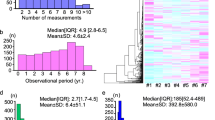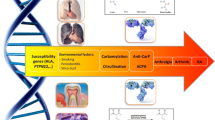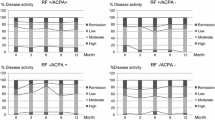Abstract
This study investigated the usefulness of biomarkers indicating beneficial response to traditional herbal medicine (THM) among patients with rheumatoid arthritis (RA). We assessed 34 RA patients who received keishinieppiittokaryojutsubu (KER), one of the representative THM. The observational term was 12 months, and we calculated the disease activity score of 28 joints every 3 months and evaluated the response to KER using European League Against Rheumatism (EULAR) response criteria. Additionally, serum levels of anti-cyclic citrullinated peptide antibody (ACPA) were measured by enzyme-linked immunosorbent assay at the baseline and after 6 and 12 months of the treatment with KER. As a result, 14 (41.2%) of the 34 patients were defined as responders, 13 as non-responders and 7 as out of assessment after 6 months, respectively. Pretreatment levels of serum ACPA were lower in KER responders than in non-responders (P = 0.042), although other univariate analysis did not show any significant differences in baseline clinical measures between the two groups. Furthermore, responders to KER showed a significant decrease in the serum levels of ACPA. These findings suggest that pretreatment serum levels of ACPA are a useful predictor of a good response to treatment with KER. Furthermore, a decrease in serum levels of ACPA may be an adjunctive indicator in predicting the efficacy of this kind of treatment.




Similar content being viewed by others
References
American College of Rheumatology Subcommittee on Rheumatoid Arthritis Guidelines (2002) Guidelines for the management of rheumatoid arthritis: 2002 update. Arthritis Rheum 46:328–346. doi:10.1002/art.10148
Kogure T, Hoshino A, Ito K, Sato H, Tatsumi T, Ohyama Y, Kawata E, Fujita K, Tamura J (2005) Beneficial effect of complementary alternative medicine on lymphedema with rheumatoid arthritis. Mod Rheumatol 15:445–449. doi:10.1007/s10165-005-0438-2
Niizawa A, Kogure T, Hai LX, Fujinaga H, Takahashi K, Shimada Y, Terasawa K (2003) Clinical and immunomodulatory effects of fun-boi, an herbal medicine, on collagen-induced arthritis in vivo. Clin Exp Rheumatol 21:57–62
Niizawa A, Kogure T, Fujinaga H, Takahashi K, Shimada Y, Terasawa K (2000) Clinical and immunomodulatory effects of fun-boi, an herbal medicine, in rheumatoid arthritis. J Clin Rheumatol 6:244–249. doi:10.1097/00124743-200010000-00002
Wessels JAM, van der Kooij SM, le Cessie S, Kievit W, Barerra P, Allaart CF, Huizinga TWJ, Guchelaar H-J (2007) A clinical pharmacogenetic model to predict the efficacy of methotrexate monotherapy in recent onset rheumatoid arthritis. Arthritis Rheum 56:1765–1775. doi:10.1002/art.22640
Kogure T, Tatsumi T, Fujinaga H, Niizawa A, Terasawa K (2007) Insights to clinical use of serial determination in titers of cyclic citrullinated peptide autoantibodies. Mediators Inflamm 2007:12367 [Epub 2007 Mar 7]
Hoekstra M, van Ede AE, Haagsma CJ, van de Laar MAFJ, Huizinga TWJ, Kruijsen MWM, Laan RFJM (2003) Factors associated with toxicity, final dose, and efficacy of methotrexate in patients with rheumatoid arthritis. Ann Rheum Dis 62:423–426. doi:10.1136/ard.62.5.423
Kaltenhäuser S, Pierer M, Arnold S, Kamprad M, Baerwald C, Häntzschel H, Wagner U (2007) Antibodies against cyclic citrullinated peptide are associated with the DRB1 shared epitope and predict joint erosion in rheumatoid arthritis. Rheumatology (Oxford) 46:100–104. doi:10.1093/rheumatology/kel052
Sghiri R, Bouagina E, Zaglaoui H, Mestiri H, Harzallah L, Harrabi I, Ghannouchi M, Mokhtar F, Ghedira I (2007) Diagnostic performances of anti-cyclic citrullinated peptide antibodies in rheumatoid arthritis. Rheumatol Int 27:1125–1130. doi:10.1007/s00296-007-0351-4
Arnett FC, Edworthy SM, Bloch DA, Mcshane DJ, Fries JF, Cooper NS, Healey LA, Kaplan SR, Liang MH, Luthra HS, Medsger TA Jr, Mitchell DM, Neustadt DH, Pinals RS, Schaller JG, Sharp JT, Wilder RL, Hunder GG (1988) The American Rheumatism Association 1987 revised criteria for the classification of rheumatoid arthritis. Arthritis Rheum 31:315–324. doi:10.1002/art.1780310302
Terasawa K (1993) Introduction. In: Terasawa K (ed) KAMPO Japanese-oriental medicine; insights from clinical cases. K.K. Standard McIntyre, Tokyo, pp 1–13
Yamanaka H, Tanaka Y, Sekiguchi N, Inoue E, Saito K, Kameda H, Iikuni N, Nawata M, Amano K, Shinozaki M, Takeuchi T (2007) Retrospective clinical study on the notable efficacy and related factors of infliximab therapy in a rheumatoid arthritis management group in Japan. Mod Rheumatol 17:28–32. doi:10.1007/s10165-006-0532-0
Pincus T, Larsen A, Brooks RH, Kaye J, Nance EP, Callahan LF (1997) Comparison of 3 quantitative measures of hand radiographs in patients with rheumatoid arthritis: Steinbrocker stage, Kaye modified Sharp score, and Larsen score. J Rheumatol 24:2106–2112
Komatireddy GR, Leitch RW, Cella K, Browning G, Minor M (1997) Efficacy of low load resistive muscle training in patients with rheumatoid arthritis functional class II and III. J Rheumatol 24:1531–1539
Papadopoulos NG, Tsiaousis GZ, Pavlitou-Tsiontsi A, Giannakou A, Galanopoulou VK (2008) Does the presence of anti-CCP autoantibodies and their serum levels influence the severity and activity in rheumatoid arthritis patients? Clin Rev Allergy Immunol 34:11–15. doi:10.1007/s12016-007-8018-1
Ogawa K, Kojima T, Matsumoto C, Kamegai S, Oyama T, Shibagaki Y, Muramoto H, Kawasaki T, Fujinaga H, Takahashi K, Hikiami H, Goto H, Kiga C, Koizumi K, Sakurai H, Shimada Y, Yamamoto M, Terasawa K, Takeda S, Saiki I (2007) Identification of a predictive biomarker for the beneficial effect of a Kampo (Japanese traditional) medicine keishibukuryogan in rheumatoid arthritis patients. Clin Biochem 40:1113–1121. doi:10.1016/j.clinbiochem.2007.06.005
Visser K, Verpoort KN, van Dongen H, van der Kooij SM, Allaart CF, Toes RE, Huizinga TW, n Mil AH (2008) Pretreatment serum levels of anti-cyclic citrullinated peptide antibodies are associated with the response to methotrexate in recent-onset arthritis. Ann Rheum Dis 67:1194–1195. doi:10.1136/ard.2008.088070
Spadaro A, Riccieri V (2005) Methotrexate effect on anti-cyclic citrullinated peptide antibody levels in rheumatoid arthritis. Ann Rheum Dis 64:1241–1242. doi:10.1136/ard.2004.032136
De Rycke L, Verhelst X, Kruithof E, Van den Bosch F, Hoffman IE, Veys EM, De Keyser F (2005) Rheumatoid factor, but not anti-cyclic citrullinated peptide antibodies, is modulated by infliximab treatment in rheumatoid arthritis. Ann Rheum Dis 64:299–302. doi:10.1136/ard.2004.023523
Caramaschi P, Biasi D, Tonolli E, Pieropan S, Martinelli N, Carletto A, Volpe A, Bambara LM (2005) Antibodies against cyclic citrullinated peptides in patients affected by rheumatoid arthritis before and after infliximab treatment. Rheumatol Int 26:58–62. doi:10.1007/s00296-004-0571-9
Alessandri C, Bombardieri M, Papa N, Cinquini M, Magrini L, Tincani A, Valesini G (2004) Decrease of anti-cyclic citrullinated peptide antibodies and rheumatoid factor following anti-TNF-alpha therapy (infliximab) in rheumatoid arthritis is associated with clinical improvement. Ann Rheum Dis 63:1218–1221. doi:10.1136/ard.2003.014647
Ahmed MM, Mubashir E, Wolf RE, Hayat S, Hall V, Shi R, Berney SM (2006) Impact of treatment with infliximab on anticyclic citrullinated peptide antibody and rheumatoid factor in patients with rheumatoid arthritis. South Med J 99:1209–1215
Meyer O, Nicaise-Roland P, Santos MD, Labarre C, Dougados M, Goupille P, Cantagrel A, Sibilia J, Combe B (2006) Serial determination of cyclic citrullinated peptide autoantibodies predicted five-year radiological outcomes in a prospective cohort of patients with early rheumatoid arthritis. Arthritis Res Ther 8:R40 [Epub]. doi:10.1186/ar1896
Acknowledgment
This study was supported by a Grant-in-Aid for Scientific Research from the Japan Society for the Promotion of Science.
Author information
Authors and Affiliations
Corresponding author
Rights and permissions
About this article
Cite this article
Kogure, T., Sato, H., Kishi, D. et al. Serum levels of anti-cyclic citrullinated peptide antibodies are associated with a beneficial response to traditional herbal medicine (Kampo) in rheumatoid arthritis. Rheumatol Int 29, 1441–1447 (2009). https://doi.org/10.1007/s00296-009-0877-8
Received:
Accepted:
Published:
Issue Date:
DOI: https://doi.org/10.1007/s00296-009-0877-8




